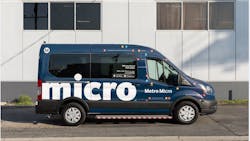L.A. Metro Micro expands to three new service zones
Metro Micro, the Los Angeles County Metropolitan Transportation Authority’s (L.A. Metro) mobility on demand pilot project, will expand to three new zones: Compton/Artesia, El Monte and North Hollywood.
These areas are currently served by Metro’s Mobility on Demand pilot project, which will end Jan. 24 after two successful years of partnering with private ridesharing company Via.
Metro Micro, the agency’s new ride-hailing service that offers shared rides operated by L.A. Metro employees in partnership with RideCo., Inc., will begin operating services in the Compton/Artesia, El Monte and North Hollywood/Burbank service zones beginning Jan. 25. Rides cost an introductory rate of $1 per ride (transfer not included) for the first six months. Rides must begin and end within each zone.
Metro Micro is designed to replace short, solo trips by offering a flexible, on-demand service in vehicles that hold up to 10 passengers. Along with other safety measures, capacity is currently limited to five passengers to reduce risk during the COVID-19 pandemic.
Metro Micro service hours in these three zones will be:
- Compton/Artesia Zone: 9:00 a.m.-9:00 p.m., seven days a week
- El Monte Zone: 9:00 a.m.-9:00 p.m., Monday-Friday, 10:00 a.m.-10:00 p.m. Saturday and Sunday
- North Hollywood/Burbank Zone: 10:00 a.m.-10:00 p.m., seven days a week
The Mobility on Demand pilot began by offering shared rides to or from transit stations in those zones as a way to expand equitable, affordable and efficient access to L.A. Metro’s existing transit network. During the COVID-19 pandemic, L.A. Metro expanded to include essential locations such as grocery stores and hospitals and continued to offer rides at no cost. The project also began delivering food and diapers to families in need in partnership with First 5 LA as the pandemic grew.
“We’re incredibly proud of the successful conclusion of our Mobility on Demand pilot project and excited that the lessons learned will be applied to continue to provide our riders new, high-quality mobility options,” said L.A. Metro CEO Phillip A. Washington. “Metro Micro has taken up that mantle of innovation and experimentation and we expect even more success as we expand its footprint to better help our riders get around Los Angeles County for essential trips while reducing traffic.”
L.A. Metro’s Mobility on Demand pilot was launched with private ridesharing company Via in 2019 and funded in part by a Federal Transit Administration Mobility on Demand grant and designed to offer a flexible, new option for first- and last-mile trips to and from transit. In its two years of operation, this pilot project provided more than 250,000 rides and met or exceeded project goals, including average wait times, ridership and average ride ratings, at 4.9 stars out of 5.
Even with the COVID-19 pandemic, ridership grew by 178 percent in 2020 as compared to the previous year, demonstrating the value and importance of on-demand technology for essential trips for vulnerable communities.
The addition of the three Metro Micro service zones will be accompanied by a request from the L.A. Metro Board of Directors for just under $6 million at their Jan. 28 meeting to cover the cost of operations in these new zones beyond the current fiscal year.
Metro Micro launched Dec. 13 in two zones, Watts/Willowbrook and LAX/Inglewood, providing shared rides for short trips. The technology behind this service allows riders to plan entire trips – both Metro Micro and their bus or train ride – in real-time using a single mobile app, internet browser or L.A. Metro’s call center. Riders can pay for the service by using their TAP card or TAP account or with a credit card.
In February 2020, the L.A. Metro Board approved awarding a $29-million contract to private ridesharing company RideCo Inc. to partner with L.A. Metro to operate Metro Micro. Similar to other pilot projects, Metro Micro staff will be continually adjusting this service based on demand and real-time results from data collected during its operation.

